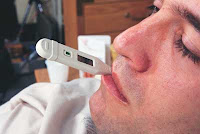A fever occurs when the body temperature rises above the normal average of 98.6 degrees. Fever is the bodies’ natural defense mechanism when fighting off infections. Illnesses such as colds and flu are caused by viral infections and the resulting fever is simply a sign that the immune system is working properly. Symptoms of fevers can include chills, aching muscles, red cheeks, shaking and feeling either very hot or very cold. Generally, the body will shiver when a fever is rising, and sweat when the fever is ‘breaking.’
Treatment to bring a fever down is required when temperature goes above 104 degrees. Common over the counter treatments to reduce fevers include aspirin, ibuprofen and acetaminophen. A fever that is too high can cause damage to the central nervous system, making it very important to treat high fevers in young children who are still developing. People living in rural areas cannot afford to treatment in urban areas. In rural people, home remedies or herbal remedies are the only ways of treatment.
Herbal remedies:
Bhoonimba (Andrographis Paniculata) is a herbal remedy that works for viral fevers like Typhoid, Malaria and Dengue. Extract a ½ cup of juice from the leaves of Bhoonimba. Boil it to warm and add a pinch of pepper. Take this juice twice a day, 1 hour after having food, for a week. In South Africa, people use an herb named Cancer Bush instead of this herb.
During the rainy season, when malaria and dengue fever are widely prevalent, tender leaves of Holy Basil (Tulsi), boiled with tea, act as preventive against these diseases. In case of acute fevers, a decoction of the leaves boiled with powdered cardamom in half a liter of water and mixed with sugar and milk brings down the temperature. The juice of Tulsi leaves can be used to bring down fever. Extract of Tulsi leaves in fresh water should be given every 2 to 3 hours. In between one can keep giving sips of cold water. In children, it is every effective in bringing down the temperature.
In fevers Guduchi (Tynospora Cordifolia) is used in a great variety of forms. Thus a cold infusion of Guduchi is given with honey bilious fever. A decoction1 of Guduchi or its fresh juice is given with the addition of long pepper and honey in chronic fever with cough.

nice post for this corona time
ReplyDeletethanks
Expressive Therapy For Depression